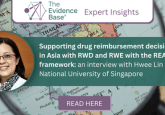Brazil’s Anvisa releases new real-world evidence guidelines

The newly published Anvisa real-world evidence (RWE) guidelines add to the growing list of guidance provided by regulatory and health technology assessment bodies worldwide.
On September 26, 2023, Anvisa (Agência Nacional de Vigilância Sanitária), the Brazilian health regulatory agency, announced the publication of new guidance to support companies using RWE to support drug safety and effectiveness. The 64-page guide, published in Portuguese, provides details about the best practices for the collection and analysis of real-world data (RWD) that can be considered appropriate by Anvisa. Like many other agencies worldwide, Anvisa is recognizing the growing importance of RWE in regulatory approvals and its ‘benefits to innovation and development in the pharmaceutical area.’
The guide, which came into effect immediately, is a draft version and is open for public comment until the end of March 2024. As noted in the press release, the guide will be updated as the agency develops their RWD and RWE frameworks. In addition to the guide, Anvisa also announced in October 2023 that they will be forming a new RWE group (called the GT-EMR) responsible for improving the quality of research in Brazil by evaluating RWE methodologies, issuing technical opinions, and collaborating on regulatory decision-making.
In developing the guide, Anvisa collaborated with several international institutes in a step towards ‘global harmonization’ in the terminology of RWD and RWE as well as in the execution, use and structure of RWE studies. The guide covers several aspects relating to best practices for RWE including:
- Recommendations for RWE studies: Advice to companies when RWE should be used in lieu of or in addition to a randomized controlled trial (RCT), such as in situations where a RCT is considered unethical, in rare diseases or in new populations.
- Challenges in generating RWE: The steps that companies need to follow to improve the quality, transparency and acceptability of RWE studies and ensure these are fit-for-purpose.
- Types of study designs: The choice of data and data sources should be based on solid methodological principles and dictated by the research question being answered, regardless of the data source. Companies need to ensure bias is mitigated when designing their study. Various types of RWE study design and their use are provided.
- RWD with regulatory standards: Companies should evaluate the quality of RWD sources and data and outline the quality and sources of RWD that can be used in regulatory decisions.
- Essential items for the development of real-world studies: The importance of structured research protocols for RWD studies is discussed, along with the elements that companies need to consider when developing the research protocol.
Want regular updates on the latest real-world evidence news straight to your inbox? Become a member on The Evidence Base® today>>>






